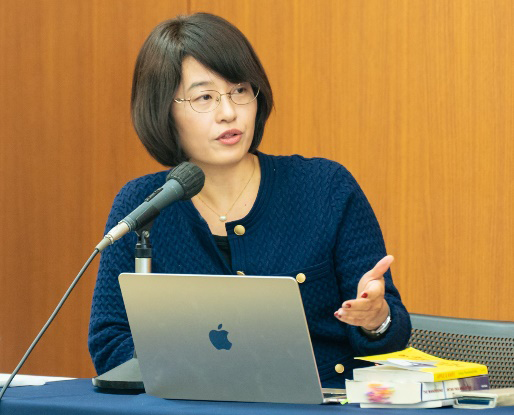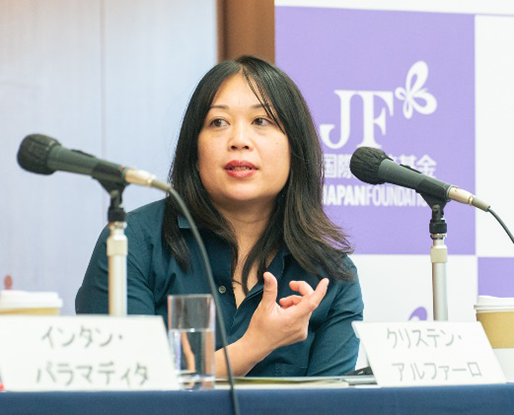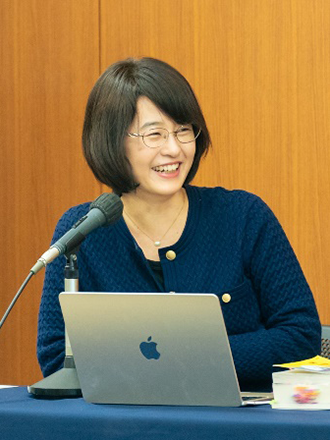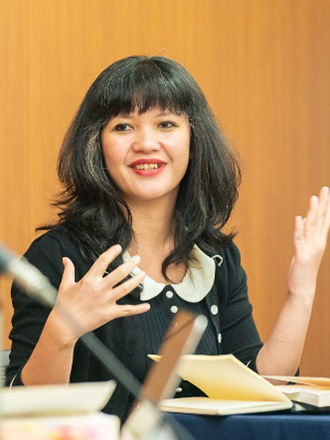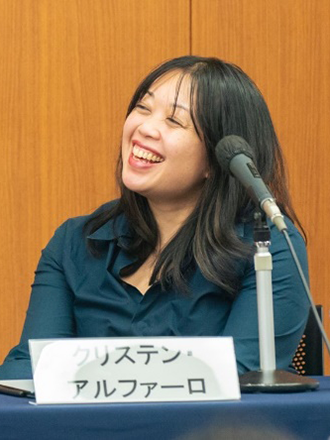Event report “Wandering in-between: Gender, Culture, and Politics”
In December 2023, the Japan Foundation (JF) held the talk session titled “Wandering in-between: Gender, Culture, and Politics,” featuring Ogawa Kimiyo, Intan Paramaditha, and Kristen Alfaro. Edited transcript of the session is now available. For profile of the panelists, please click here.
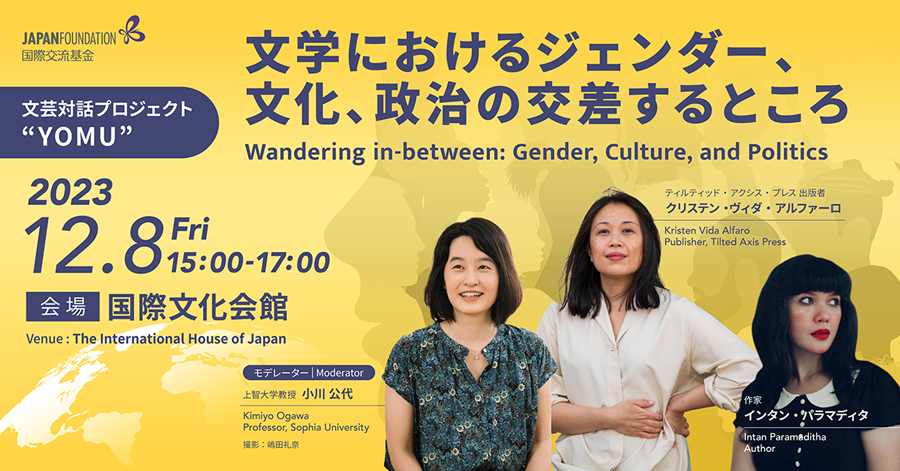
Encounter with literature
Ogawa Kimiyo: Thank you very much for your kind introduction. I am Ogawa Kimiyo from Sophia University, and I will be the moderator of today’s session.
Intan Paramaditha, as introduced earlier, is the author of The Wandering and Apple & Knife. These two books were translated from Indonesian into English and published by Harvill Secker, Penguin Random House UK and have received awards in Indonesia, such as the Tempo Best Literary Fiction, as well as the PEN Translation Prize from the English Pen. I heard that The Wandering was written when Intan could physically freely move from one country to another. I also heard that it was published in English in 2020 when the coronavirus pandemic was quickly spreading globally, and that's when the whole world was closing its borders. Ironically, when Intan was trying to sell this book, which is about physical mobility, she was enclosed in a national boundary.
Kristen Alfaro is the Director of the publishing house, Tilted Axis Press, in the UK. Yu Miri's novel Tokyo Ueno Station, translated by Morgan Giles, which won the National Book Award for Translated Literature in 2020, was published by this publisher. Tilted Axis has also published Matsuda Aoko's book, Where the Wild Ladies Are, translated by Polly Barton. I think Tilted Axis is very impactful in terms of what they do for those well-known Japanese authors. Interestingly enough, Where the Wild Ladies Are takes classic Japanese ghost stories to make them more relevant to the contemporary world. I think there is something that Intan has in common since these two books have gothic elements. I think the ghost stories, which I want to explore today in our talk, have potential in the bookselling market in the future.
This talk event is going to be a literary exchange and dialogue about Wandering in-between; the title is borrowed from Intan’s novel, which is about moving between various places. All of us are stuck here physically, but we will travel imaginatively today. Wandering in-between different countries, different cultures, and different stories. Together with Intan and Kristen, we would like to explore the questions that are most pressing to us, namely gender, culture, and politics. I think the title Wandering in-between suggests many things, not just travel and physical mobility, but also freeing oneself from a given set of values, conventions, and perhaps stereotypical images of women. Before I start asking questions, Intan, can you tell us a little bit about how you came to be a writer? What motivated you to become a novelist?
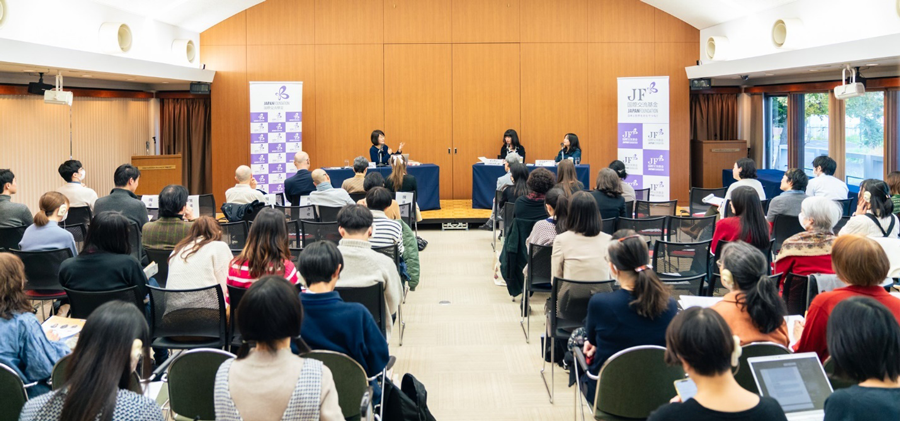
Intan Paramaditha: I grew up with stories and books. I didn't come from a very wealthy family, but my mother would buy me books when I was a child. When I was in elementary school, we only had one television station—the National Television of the Indonesian Republic. They would air propaganda films about the military, which was very boring. So, we spent a lot of time reading. In the 1980s, there was this emergence of satellite TV, and we could finally see shows from different parts of the world, such as MTV, but before that, it was very limited, and books were the only vehicle for us to transport ourselves to different realities to imagine different ways of living and being.
My mother would also tell me stories. Sometimes, she would read books for bedtime stories, but often, she made up her own stories, and they were quite inconsistent. It was like a serialized story that would end in one place, and then the next day, when I asked her, "Well, didn't she end in that place?" And she just changed the whole story! But because of this experience, I started thinking I could probably do that as well and decided to experiment with stories. Back then, it was more about how I wanted to tell stories similar to what I read as a kid. But when I grew up, I had more questions. Till today, I have always been haunted by what kind of story I want to tell and why I am telling a story. This morning, if anyone follows the news, there was this author, a Palestinian author, who died in a targeted air strike. He was a writer and an English professor. He used the English language to speak about the reality of his people to the whole world because it's important to tell stories. Now, in a situation like this, where someone can die for telling a story, what kind of story should we tell? That's my biggest question.
Ogawa: Thank you, Intan. That reminds me of Virginia Woolf, who wrote in Three Guineas about a poet who died in the First World War and wanted to tell a story about that poet. I think we are left with a choice of whether to tell this story or not, which story is valuable to write down. Kristen has been finding stories and exploring the possibility of introducing these kinds of stories in Asia, as well as in other parts of the world, which she thinks is worth telling. Kristen, can you tell us a little bit about your experience of why you became the director of a publishing house, which I think is a big job?
Kristen Alfaro: Accident (laughs). What kind of stories we should tell and what kind of stories we decide to publish is where I am coming from, and that's a big weight on someone's shoulders in the context of the stories that we tell or that we choose to publish. How I became the director of this Press is quite random in a way, as I don't come from publishing. Actually, Intan and I were in the same PhD program at New York University. We didn't know each other then, but we both studied film. I went from experimental film and art to literature.
I applied for a job with Tilted Axis Press, and Deborah Smith (the founding Director of the Press) offered me a full-time managerial position a year later. She later left the Press, and that's how I ended up here. I chose to apply to Tilted Axis Press because I had only been reading translated fiction at the time. I had been stuck in academic writing for many years, and I wanted other worlds; translated fiction offered that to me. What drew me to this particular Press is the fact that it was a feminist press, and it published intersectional stories that I didn't come across so frequently.
Compassion involved in all parts of the publishing process
Ogawa: Kristen, when we were talking about the kind of story you would tell through your medium, you said that your motivation to publish is very different from that of other publishers. That was interesting. You said it's not money, it's not reputation, but it's compassion.
Alfaro: Well, we could use money. We must eat. All authors must eat. (laughs)
Ogawa: Yes, money is also important, of course, but there is something more than that, right? It struck me because, as the director of a publisher, you will have to make money to keep going, and to say compassion, is it viable to say that and keep on publishing something that you feel sort of compassionate about, and the theme of the book is also about compassion, perhaps. Compassion is a very interesting word, and I would like you to elaborate on what you meant yesterday.
Alfaro: When I say compassion, a lot of our stories are indeed told with a certain level of compassion for the people who exist for the characters in the stories. What I also mean by compassion is the way that we work and relate with each other. Tilted Axis Press is a publisher of mainly translated literature from Asian languages and continues to increasingly translate African languages into English. This means that we publish global majority authors, many from the Global South. We have to think about the context within which we are bringing these authors into the UK, mainly where our Press is based. We have to have compassion.
People come from all sorts of backgrounds, both authors and translators. Also, within the publishing house, I am the only full-time person. We are quite small. There needs to be a reciprocal kind of compassion because the labor is extensive on both sides. Some things don’t happen as quickly as with major presses. So, there are layers of compassion. Foregrounding it does kind of challenge quicker viability or quicker economic returns, but I think it is important to try to exist in that way to embody values.
I think this is also my thinking about what ties our books together. We have a small list, and, for me, it's always about how the books relate to each other. I have come to think of our list as a literary archive of stories that aren't necessarily published or translated into English. It's a way for you to see a different type of compassion that a writer has for the characters of the book, different stories, largely oppressed. That's the kind of stories that we want to publish.
Ogawa: How do you draw together the theme of compassion in Yu Miri's work?
Alfaro: You can see that in evidence in The End of August. I spent time with Yu Miri in October when she was on a tour in England. I got to learn more about her writing process and the translator, Morgan Giles, and her writing and translation process. That book is extremely difficult to translate, and it took a long time. It required a lot of archival research. That kind of understanding of the labor is also another level of compassion that I think is involved in all parts of the publishing process. That story spans decades, and there are so many characters that exist that you have to follow and that you have to listen to. With Yu Miri, there is so much compassion within her characters and how she writes about them. I love how that is a constant theme in her work.
The Wandering—questions of global mobility and privilege
Ogawa: That ties in well with what Intan is trying to do, I think. The first impression I got from reading The Wandering is your use of the pronoun “You.” Usually, if you start reading a novel, you begin to have compassion toward the narrator. Usually, it's an objective point of view, but Intan used “You” to promote, I guess, the reader's compassion for the story that we are reading. “You” are going abroad, “You” are experiencing this, “You” encounter these people, and so on. This narrator, “You,” has these two powerful red shoes. If anybody has read Wizard of Oz, you know these powerful shoes that belong to the Wicked Witch of the East. In a sense, this book is endowing these powerful shoes to the reader, enabling them to travel with the narrator, which is very involving. How did you come up with this kind of idea of setting the narrative in the second person?
Paramaditha: The Wandering is a Choose Your Own Adventure story, and you can choose your paths. For instance, if you want to go to New York, you go to this page. If you want to go to Berlin, you go to that page, and so forth. This is called a Game Book. I read Choose Your Own Adventure books when I was a child. Traditional Choose Your Own Adventure novels are mostly about adventures such as going to an exotic land or another planet—something like that. But I wanted to make an adult version of Choose Your Own Adventure book that questions the politics and the privilege of traveling because not all of us can travel. Some of us are expats, but some of us are migrants or refugees, and there are different categories of travelers along with different privileges. “You” is very specific to this format, and it’s like a convention in a Choose Your Own Adventure book. In The Wandering, “You” is positioned as a young woman from the so-called third world, Indonesia. As she didn't have the privilege to travel, she had to make a bargain with the devil. The devil gives her a pair of red shoes that take her to New York or other parts of the world. The problem with the red shoes is that “You” can go to New York—it's like your means of transportation—but if there you don't have a support system, you don't have a job, or you don't have the education expected to get a proper job, then you are doomed basically.
This story is about what it means to travel without all these privileges and what it means to travel as a brown woman. If you travel as a white man from a first-world country, for instance, it's very different from if you are a woman from the global south. The experience is different, and the kinds of boundaries/borders are different. That's what I try to explore. What does it mean when you are positioned as this woman? It was interesting because, in Indonesia, many readers feel that they are connected to this character. I think a lot of Muslim women with hijab feel, "Oh, yes, I want to travel with the red shoes." When it's translated into English, it's quite interesting as well because men are forced to be put in this position, and some of them actually like it. I was in Poland in October, and many of the readers were men. They said, "Yes, very different because I am a white man. I don't know how to be a woman from the Global South, but I like it." Of course, not everyone can relate, but for those who can relate, it's probably a way to experience or imagine how it feels to be in someone else's shoes.
Ogawa: Literally! You are saying this narrative technique was effective in promoting or facilitating readers’ compassion, inviting them to feel the same way as a woman in the third world.
-
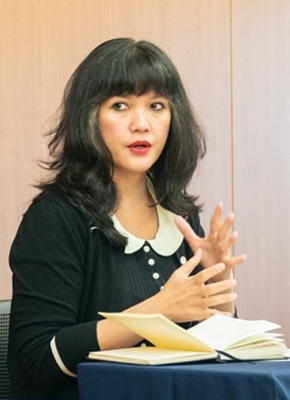
-
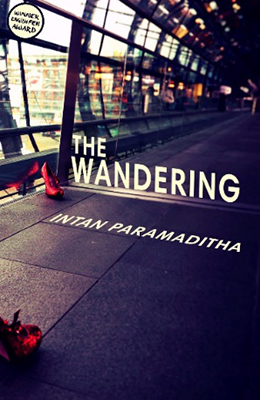
(c) Harvill Secker
Paramaditha: Yes. What I want to show in this novel is not just “You” who travels, but also other characters. The narrator meets different travelers with different experiences. Some of them get to that place because they are forced to leave their country or they are looking for better opportunities. There are various reasons. I think I would like to imagine a space where different travelers can meet. But these are not wealthy travelers. I called the book “a book about cosmopolitanism of the common people” because that's what I experienced in New York. When I did my PhD, I was living in Queens, a very diverse area where you could meet migrants from different parts of the world speaking different languages. I was a poor PhD student, and I would hang out with Indonesian migrant workers who had no legal documents. The experience was very different compared to, let's say, when you hang out with your friends at New York University. I feel there is a possibility for cultural conflicts because people are very different, but there is also a possibility for connection.
Diversity as tension, gaps, and relationality
Ogawa: I did feel that while reading the book. Regarding this kind of multicultural, multiethnic environment in which you have developed a certain sensibility toward these others, one of the impressive scenes was this narrator’s encounter with Mina, the character that I particularly like. Mina is a migrant, and she is a great cook who uses spices. The first encounter between the narrator and Mina is a kind of failure, and there is this awkward moment when they first meet, but eventually, the narrator comes to realize Mina’s great cooking talents. As Mina is a minority on this side, nobody talks about her, and she is almost invisible, but this narrator recognizes her talent and personality. They become intimate, and eventually, there is this kind of female solidarity toward the end of this little story.
And the spice comes in. Spice and literature together have always represented something—trade, globalization, and possibly anti-colonialism—because spice represents diversity. Kristen said yesterday that she has an ongoing project on Afro-Asian translation literature, in which lots of food is being described. I think this kind of female realm or domestic sphere has to be told much more than now. Can you both tell us about the attraction of focusing on the day-to-day state of life, or why is it women, perhaps?
Alfaro: I think it's also a part of our own experiences at the Press. My colleagues who work part-time with me are all from other places. We didn't grow up in England. There are a couple who have ties to England, but essentially, we have backgrounds from Sudan, the Philippines, Vietnam, and Brazil. And one of the commonalities of that is food. It is the dinner table. It is coming together and exchanging. The kitchen table was so much more of a space for my family rather than the living room. Food was always there. Even if someone doesn't have enough food, they give you food anyway.
That element of food is naturally a part of each of our personal experiences. We see these elements in the books that we are acquiring and that we read and the value of it, the importance of the reasons why they are there. So, food is another way to bring people together. This project that was discussed yesterday is a project that Tilted Axis hopes to do with the Afro-Asia Group, which is run by Dr. Tao Leigh Goffe in New York City. We hope to connect our readers with the history of Afro-Asia solidarities in film and literature through shared meals.
One of Tao's aims was to foreground these spaces, which you don't see in pictures of the Afro-Asia group. You see pictures of men, the writers, and the filmmakers, but there were women there, too. So, where were they? I was at a talk by Olga Ravn, the author of The Employees in London. She said, "Well, Marx didn't make his own soup. Who fed the revolution?” Questions like that are how we think about literature.
Paramaditha: It’s true that spices represent diversity, but as you mentioned, spices are also about colonialism. They are about blood, division, and violence. In The Wandering, I mentioned how the Rhun Island in Maluku was bartered with New York, then New Amsterdam. It was a treaty in the 17th century between the Dutch and the British. As the Dutch wanted more spices, they said, "Oh, okay. Just take New Amsterdam, and we will take Maluku." I don't know if they regret it (laughs), but it's about control. It's about the power to have more and more. In the book, I also mentioned that there is a history of spices.
As a reminder, diversity is not about tokenism. Diversity is not just about consumption. Sometimes, we are happy enough to have an event with different speakers from different parts of the world, like a mini dollhouse. If we think about true diversity, it's not just about bringing everyone together with different backgrounds. It's also about acknowledging differences and cultural clashes, and that's what I experienced in Queens, New York, which I also wrote in the book. Often, we couldn't understand each other due to language and cultural barriers. Often, I got impatient with my Chinese landlord, who did not speak English. But you must acknowledge that diversity is also about tension. It’s about gaps. When you start acknowledging it, then you will find a way to connect. You have to work harder to make a connection.
Alfaro: One of the questions that I’d like to think about today is what kind of knowledge can be produced when you take these conversations outside of institutional spaces. What is different about it? What kind of relationships do you form when the environment is different?
In England, diversity is such a big thing for arts grants. It is often ticking boxes (minority-led, majority women, etc.), “This press covers all the boxes,” but it’s not about that for us. There are a lot of discussions about the politics of representation, but that’s not what we do. It’s not about finding a mirror of yourself and relating in that way. It is about exactly what Intan has described. It’s about the tension. It’s about relationality. And it’s about that space. That’s what we’re trying to do with our books, and that's how we try to reach and be in conversation with a global diaspora.
Literature constantly in conversation with the times
Ogawa: I completely agree with what two of you just said. I think that's where literature comes in because tokenism simply superficially pretends they have already solved the problem by mentioning discrimination or equality. It does draw attention and make it popular, perhaps, but it’s much longer term than just saying that there is a problem. I think stories are needed in order to push that further. By actually writing the story about these real people that you have seen or encountered, you are making the reader realize that this is a long-span project going back to the 17th century, as Intan just mentioned. That is how far we have to go back in order to think about the real problem that we are facing today. We have to think about what we are up against in terms of two hundred years, three hundred years, or maybe a longer period, and literature does actually do that.
I am glad that Intan has published this book, Apple and Knife, which are mostly adaptations of well-known stories that have been told for over 500 years, maybe longer, and making it relevant to our time. Repeating the same story but looking at different characters. I loved the story entitled “The Blind Woman Without a Toe,” a retelling of “Cinderella.” Cinderella is the protagonist in the original story, of course, and who would talk about that stepsister, that evil stepsister who is blinded and loses the toe? Well, Intan has done that with this story. I was first thinking, "God, what is this story going to be about?" But halfway through, I thought "Yes!" as you couldn't agree more. Who has the most privilege in the story of “Cinderella”? Of course, Cinderella, because eventually, she does get the castle and the handsome prince. But this ugly stepsister is left in poverty, blinded without the toe. How's she going to survive? Then, you start to think about the relevance of the story to our time. Perhaps you might think about single mothers who are in poverty or about lookism. Why does society judge women by beauty? Intan questions this aesthetic value that we share—that a beautiful white woman has always been the standard of beauty. Intan, what made you think about this adaptation in the first place, and what is your aim?
-
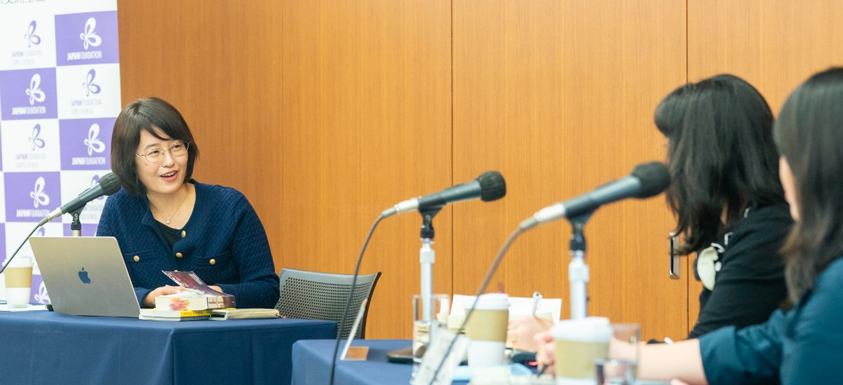
-
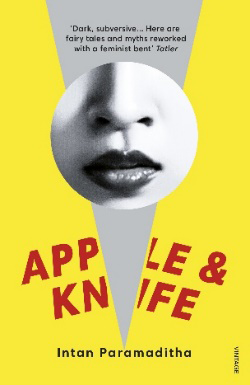
(c) Harvill Secker
Paramaditha: “The Blind Woman Without a Toe” is a feminist retelling of “Cinderella.” I am going to read just a passage from here.
"The ball was the climax of these events. We were merchandise in the market and Prince Charming was the sole customer. Of course, he couldn't purchase everything on display. He had to choose the best to be his queen."
When I was experimenting with this story, I wanted to put “Cinderella” in a more capitalist structure or make that structure more visible, to show that we are all pitted against each other. We are forced to compete to get the attention of, in this case, Prince Charming. Prince Charming could be anything. It could be a man, it could be wealth, or it could be a nice job. We are forced to compete with women against women, and that's the kind of society that we are living in. Beauty is part of that. Just trying to make a connection with other authors, Matsuda Aoko has a story about a woman who is eager to remove all of her bodily hair because that's the idea of being beautiful. We need to interrogate this and what it is for. This is often to make yourself presentable because if you are not presentable, you won’t get this job, or you won't get a partner to marry. It's about how women are situated in the market, and they have to compete. I wrote other stories about how women collaborate in decent or indecent ways or demonic ways. We need to acknowledge that women do compete because the structure forces us to do so. We cannot think about other people because the structure is just so oppressive.
Ogawa: That’s really interesting because we are in a similar situation here in Japan. We have this kind of cultural force that works on us. I think a lot of us feel very much pressured to marry, and especially this heterosexual-centered or patriarchal sort of structure is so strong and so powerful that most of the time, we just simply internalize the value of heterosexuality. Do I really want to form a nuclear family, or do I want to remain single and form, perhaps, a pseudo-family? We have these eye-opening novels in Japan, like Nise Shimai (Fake Sisters), written by Yamazaki Nao-cola. Why do I have to get rid of all my hair, or why do I have to keep living with my blood relations? I don't think Japanese people are prepared to accept that sort of alternative way of living, an alternative form of community-making. Kristen was telling me about this extended family that you value in your culture. Would you like to tell us about it?
Expanding the definition of family
Alfaro: Yes. I have so many titas and titos that are non-blood-related aunts and uncles in Tagalog. They are so important, and you have to understand the history of why these extended families in these communities came about. For myself, my mother immigrated to Canada as a nurse. It was the American education of nursing and health that brought her. She left her home when she was about sixteen or seventeen. Her extended family became her colleagues with whom she went to nursing school, and they all immigrated to Canada or the U.S. That was such an important moment that could only have happened because of the history between America and the Philippines.
There is that kind of connection that seeks extended family. Just to go back to the Tilted Axis Press, I always think of the people that we work with and the people that we collaborate with as family. It is a complex word that could trigger certain emotions for other people. But it is also another way to go back to a tension that exists and that will always exist and to accept that it will exist and that you have to work through it.
Ogawa: I can now understand why you said you prioritize compassion over money because I believe community-forming requires a certain amount of compassion.
Paramaditha: As authors and publishers/editors, we can't write all the stories in the world, and we can't publish all the stories in the world. I think it's our job to keep amplifying other people's stories, not just our stories. That's what I do with my feminist collective in Indonesia. It's called Sekolah Pemikiran Perempuan, or The School of Women's Thought in English. What we do is to amplify other people's work, including that of women and gender minorities. One thing that also inspired my new novel, which has not yet been translated into English, is the community that redefines family.
In Indonesia, there are communities of transwomen in different cities, but the one that inspired me especially is the community in Jakarta, where many older transwomen are Muslims. They organize their life like an Islamic boarding school. They take care of each other because many transwomen live on the street as sex workers. They create a family, and many transwomen are mothers and aunties. I find that that's revolutionary. I think that really defines the idea of family. I incorporate some of the themes in my new novel, but I think my friends and I are responsible whenever we have the opportunity to let them tell their own stories. I guess that's what Kristen and Tilted Axis Press are doing as well.
Ogawa: That echoes with The Care Collective I mentioned yesterday. The Care Collective has published a book called Care Manifesto, which was translated into Japanese two years ago as Kea Sengen. If anybody is interested in Care, please take a look. There is this theme of family. Can we select family members? I think the meaningfulness of this book being published in Japan is that we still haven't legalized same-sex marriage. The unnaturalness of that to me is shocking. Why isn't it legalized in Japan, whereas the UK and a lot of other European societies have already adopted this idea? I think it's important that we start having a conversation about the possibility of non-blood-relation-based families. Families based on care and compassion could be our future possibility and future hope for doing away with antagonistic sentiment or prejudice against each other.
Using a genre gothic as a strategy
Ogawa: Now I want to ask about gothic. There is this very interesting theme of gothic in both of your works. Apple and Knife is very much a gothic story about these women. Intan pays attention to not only beauty but also focuses on these evil witches who are considered harmful or evil. It never had any positive meaning until very recently, but in Japan, we are starting this kind of witch boom because Suisei no Majo, or Witches of Mercury, has become a popular animation, which is a new series derived from Gundam, an animated robot series originally popular among boys. This adaptation, Apple and Knife, has lots of witches who aren't necessarily just bad. Why did they become witches, or why were they recognized as witches? One of the stories that caught my attention was “Beauty and the Seventh Dwarf.” As you can imagine, the story is an adaptation of “Snow White.” In this story, this witch is quite ugly, and she is a brilliant scientist. She used to be one of those beautiful, heroine-like characters, but the important part is why she disfigured herself. It's a very gothic story, but if you read on, you realize that it's not just a simple gothic story. It's a personal and compelling story about a woman.
Paramaditha: Maybe, just a little bit of my background and why I am interested in the gothic. I did my BA at the University of Indonesia and wrote my BA thesis on Mary Shelley's Frankenstein. I compared that work with the work of her husband, Percy Shelley, but Frankenstein was more attractive to me. I was very much influenced by British Gothic literature, and then I started to explore more after that. For instance, Margaret Atwood also has a lot of bad women in her work. I discovered Angela Carter, who also wrote about bad women. I was very much influenced by white women, I would say—I hadn't decolonized my reading. I then started to look for more Indonesian sources, and there was this women writer, Toeti Herati, who wrote a feminist interpretation of the Balinese legend of Calon Arang. We translated her work as well. Calon Arang is a witch in Bali, and the story is that the king and the priest had to get together to trick Calon Arang because she was so powerful. They had to kill her because she was just too smart and threatened the kingdom and religion. I read the story of witches through the lens of how someone really smart, especially if she is a woman, can be threatening to power. That's why I became interested in witches. Why, in the story “Beauty and the Seventh Dwarf,” is she a scientist? Because it's about knowledge and how possessing knowledge can be seen as a threat.
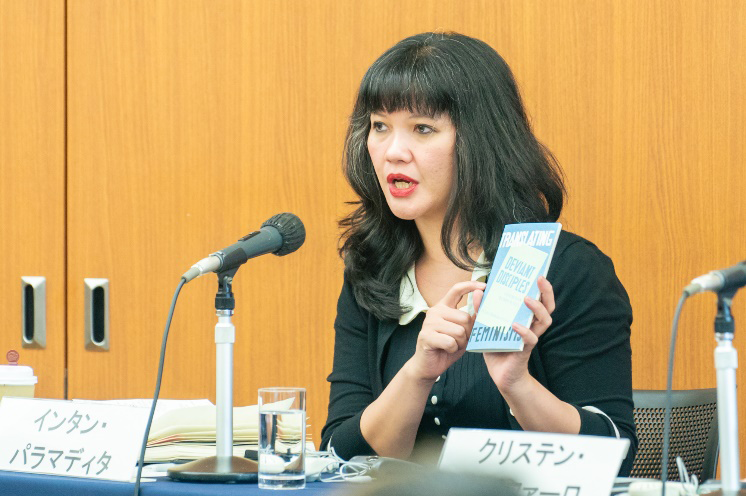
Ogawa: Well, my thesis was on Frankenstein when I did my MA.
Paramaditha: Cool! We should talk more. (laughs)
Ogawa: Three of us just happen to have this gothic theme going. Interesting. Going back to Yu Miri, maybe there is something connected to what Intan has just said about science or the Gothic. Yu Miri's The End of August is a ghost story. Not many people know it, but Frankenstein was written as a ghost story. Percy Shelley and Byron, Poridori, and Mary Shelley all got together and read Fantasmagoriana, a collection of gothic stories. They read it together and said, "Why don't we all write a ghost story?" That's why Mary Shelley started writing Frankenstein, which turned out to be not quite a ghost story but a scientific kind of creation of life. Anyway, Kristen, can you tell us a little bit about The End of August, having this grounding on Yu Miri's cultural background as a Japanese-Korean? Do you think that using a genre gothic as a strategy would put forward a certain theme a bit more because it does accentuate her Korean-ness, perhaps?
Alfaro: The End of August—I think the way that it opened to me was mind-blowing when I first started reading it. It's just you are immediately jumping into movement and breath, and there is a lot of breathwork in this novel. It is the ghost that you are immediately introduced to, but then it ties into Korean shamanistic rituals. It's not quite as common to read in the English language. You are kind of disoriented in the beginning and not sure that it is a ghost that you were first introduced to. It's a particular device, in this case, to reach a history that you don't quite know yourself. I think it's such an interesting way to access one's own history because it is semi-autobiographical. The way that she described this in the tour was, “This is fiction, but it is not a lie.” I think the gothic device of the ghost is important in that sense.
It also reminds me of a Vietnamese author that we published, Thuân. We published her work, Chinatown in English, and we are going to publish her second novel, Elevator in Saigon. To market this book, we are going to partner with the An Viet Archives, which is the largest British-Vietnamese community archives in London. We want to do an event with them that highlights the post-colonial ghost story element of Elevator in Saigon, accessing the archives through the ghost stories to tie in difficult questions within literary spaces.
Ogawa: In The End of August, there is this deceased woman who was victimized during the war, along with this male runner who is a ghost. I think this is a form of exorcism in a way because by understanding the story of that comfort woman, you are somehow salvaging, or saving the soul of a woman. To have this story meaningful or have this story told, we need to hear the voice of this woman who died thinking, "Why am I dying? Why am I victimized?" Nobody has heard her voice until now, until the 21st century, and only in the form of a ghost is she allowed to appear. I think that's realistic because a lot of comfort women are dying, and their voices aren't heard. For me, that was the most realistic part of this story. Intan, in relation to how Yu Miri is using gothic as a way of putting forward this problem as something ongoing, is there any kind of conscious awareness that you have in using this gothic genre?
Paramaditha: Gothic stories can be very disturbing. I think when we feel disturbed, we become aware of the reality around us. Because we are disturbed, then we ask, why are things this way? Why is it not normal? Then we start asking questions: what is normal? I think many writers use this style to ask questions about what is normal and acceptable and how we unthink the ways in which we think about the normal. I keep reading feminist horror and gothic stories like Matsuda Aoko, Bora Chung from South Korea, and Mariana Enriquez from Latin America, for instance. They are talking about not only gender but also class, urban problems, and capitalism through horror and gothic styles.
Reclaiming cosmopolitanism
Ogawa: Thank you for mentioning those words. I was trying to come to this topic of cosmopolitanism, and you have hit the right word, like class. You emphasized the point in The Wandering about certain groups of people getting away with going over the national border, but the rest of the people remain. We all take it for granted that we have a passport, which is a privilege that certain people have. Many of us, including the three of us, have traveled all over the world. I have always had this feeling of ambivalence and guilt about being a cosmopolitan person.
At the same time, cosmopolitanism has its own value. It’s important because, like James Joyce, who was a typical cosmopolitan, it allows you to see various cultures by traveling. I think you do need to go out of your country to see and experience differences, as Intan said earlier. Is there any kind of balance that you see or feel right?
Alfaro: In the context of my role at Tilted Axis, I think about it more as a collaboration. It's a way to think about translated literature and publish translated literature in a way that supports and develops community and solidarity. I think about it as coalition building, and that is how I try to approach the privilege of travel. There is a goal that I hope to achieve. As Intan said with her experience of living in Queens, about those two different types of people that she interacted with, I want both of them to be our readers. I want both of them to engage with the stories that we publish. That requires, again, more work, more tension, and more discomfort than you have to endure.
Paramaditha: The sad thing about cosmopolitanism is that it's often attached to consumption or the ability to consume other cultures. I wrote an essay about travel and cosmopolitanism in Literary Hub if anyone is interested. When I wanted to reflect on my experience of traveling in The Wandering, I was not able to connect to other books by privileged people, like, for instance, Elizabeth Gilbert's Eat, Pray, Love, where you heal yourself by going to India, Italy, and Indonesia. Who has the money to do that? (laughs)
The term "cosmopolitan" comes from the Greek word "kosmopolítēs." This was coined by Diogenes, a Greek philosopher who lived on the street. He was a hobo, and "kosmopolítēs" was not about luxurious travel. For Diogenes, it was more about the ability to think beyond parochialism and ultra-nationalism and connect with other cultures. I think it's important, especially for those who did not get to experience the connection. That's why I thought people like us should reclaim cosmopolitanism regardless of how hard it is.
To come to Japan for a few days, I had to get a visa. I was in Poland, and I had to get a Schengen visa because of my passport, which is not something that everyone experiences. There are more powerful passports if we think about the hierarchy of passports. We need to think about those hierarchies and privileges when we celebrate cosmopolitanism.
And I agree with Kristen about solidarity. We need to think about cosmopolitanism not as a means to consume but as a means to connect and build solidarity. For instance, we had the Black Lives Matter a few years ago. The movement spread to different parts of the world. We can think in a more cosmopolitan way about this movement, for instance, how to think about Black Lives Matter in Japan. People in Australia definitely thought about it in terms of the rights of the indigenous people. People in West Papua talked about Indonesian colonialism through the Black Lives Matter hashtag. I think that's how we need to think about cosmopolitan solidarity. How could we be free from oppression together rather than just consume, consume, and consume?
Ogawa: Thank you so much. That was very interesting. I mean, I have never actually thought about the hierarchy of passports in the real context.
Now, we would like to open up the discussion to the floor. Is there anybody who wants to ask questions or make comments?
Questioning feminism
Question 1: Some popular female rappers in Indonesia talk about feminism and, at the same time, performatively, they need to have aesthetic appeal or beautiful looks. I found it a little bit contradictory. Will you share your thoughts on this?
Paramaditha: I do think that we are full of contradictions. Everyone is full of contradictions. In the case of women, perhaps they are struggling within the industry, and they just have to look pretty. The first thing that we need to think about is how we are complicit to the system and how we use our position to think about other women. My problem with a lot of expressions of feminism in various parts of the world is that feminism is used as a language of self-improvement, to get a more successful career, and to break the glass ceiling. I think that's neoliberal feminism. Feminism that aligns with neoliberal values requires you to be successful; you need to have a good career and a good family, balancing the two. Everything is measured within the capitalist standard of success, and beauty is part of it.
The more beautiful you are, the better your visibility is. Perhaps we are also complicit in it by not being ugly, you know. I think we need to question feminism as well. Feminism has to be intersectional. It is not just about gender because gender can't be separated from other factors such as class, race, and geographical location. In a big country like Indonesia, geographical location really matters. For instance, I was raised in Java, in Jakarta. I was very privileged in that sense. I had more privilege than my fellow Indonesians who lived in the Eastern part of Indonesia. We need to think about how these factors work together. It is not just about women's liberation. It is all about how these different factors contribute to specific oppression that people experience. Sorry if I didn’t really answer your question, but beauty is part of the package of neoliberal feminism.
Ogawa: We are in an age where post-feminism has set in. Part of this post-feminism problem is related to these questions: how do we reach out to the world; how do I use my beauty strategically to vocalize what I want to say to the world? Post-feminism has actually used, strategically, some femininity in order to vocalize their voices. I think negating or rejecting femininity is all good for second-wave feminists. "Yes, we have become masculine. We take part in this public sphere. We have voices here." But there is this kind of elitist tone to it. What about those people who, like Intan said, live in the Eastern part of Indonesia? How do they climb the social ladder? I think there are many ways in which they can try, but at least we are in a capitalist society where we have to struggle. Some people utilize femininity to express what they want to say, and there is always an ambivalence in doing that. A lot of people would say, no, you shouldn’t manipulate.
Alfaro: I think feminism is also about choice. The choice to keep your hair or to shave your hair.
Ogawa: Yes. And it’s not always for the attraction of men. We can feel good about ourselves when we, for example, beautify ourselves. Dressing in nice clothes might make you feel good, perhaps, and that’s, again, about choice.
Paramaditha: Talking about beauty is hard because sometimes women are belittled because they might look beautiful. “Oh, that author is beautiful, and, therefore, she gets a lot of attention.”
Alfaro: Yes, or no respect in an academic sphere.
Paramaditha: At the same time, I do believe that there is this thing called beauty privilege, and you just need to be aware of the fact that you are probably more visible in your job, in whatever profession that you are in, because of how you look.
Ogawa: Yes, it's tough being a woman. Any other questions or comments?
Question 2: What is the situation of Muslim women and transgender people in Indonesia? How did you deal with the topic in your work?
Paramaditha: Thank you for the question. The status of Muslim women in Indonesia is very diverse in terms of their position and articulation. We have been experiencing its Islamic conservatism since the fall of Suharto in 1998. There are more conservative voices in the public sphere. But at the same time, we have stronger and more visible Muslim feminist groups. Muslim feminism in Indonesia has been around since the 1920s. They are some of the strongest in terms of the women's movement. Now, they are battling the voices that tell women, "You don't have to pursue education. You just need to stay at home."
In fact, they organized regular conferences of female ulama or female Muslim Leaders, and they would issue fatwa. Fatwa means law for Muslims. One of the fatwas mentioned that polygamy is haram. Polygamy is forbidden because it doesn't recognize the rights of women. And it's not just about polygamy, but also an environmental crisis. They say that any action that leads to the destruction of the environment is haram. That is so cool! Some transwomen communities use Islam to build a connection with society. We often think that transwomen can't be religious, but many of them are Muslims, and many of them are leaders. We just lost one famous transwoman Muslim leader, Ms. Shinta Ratri, who passed away in February 2023. So, there are very diverse voices of feminism in Indonesia, including Muslim feminism.
In terms of transwomen's rights, even just to change their names is very difficult. When they want to change their names on their ID cards, they face many kinds of discrimination. The middle upper-class transwomen might be better in terms of the status and the treatment, but transwomen who are working on the street often face violence. But they are also very strong as the transwomen communities organize and build collectives. My feminist collective also works closely with them. What’s exciting about Indonesia today is that—yes, it is more conservative, and yes, the political elites are horrible as always—but the collectives and communities on the ground are getting stronger.
Creating spaces for solidarity and new connections
Question 3: Facing all these problems regarding feminism or marginalized groups, do you think we can unite with East and Southeast Asian culture, including literature?
Alfaro: I can start by talking about some of the efforts that Tilted Axis is making to collaborate with and help form spaces to unite people. One example is that I worked with a Thai publisher called Soi Squad, who also functions as an agent and promotes a lot of particular Thai literature. We partnered with them to create a Southeast Asian Literary Forum, and we invited people from across Southeast Asia—they were publishers, translators, and writers. We brought them to Bangkok and had different panels to talk about editing, funding, and how important it was to create these spaces to have these conversations because some of the already existing forums and spaces are festivals. There is the Ubud Writers Festival, Georgetown Festival, Singapore Writers Festival, and so on, but they are not catered toward having these kinds of discussions. So, we wanted to create that in Southeast Asia. We would move it across different countries so that more people from different places could attend, as the whole idea is to bring about new connections. It is difficult to continue funding this project, but you just continue being in conversation with each other, and hopefully, we will be able to fund another one soon.
We also try to partner with different publishers. The next project we have is with Gantala Press, a feminist press in the Philippines. I will be going there in April to document recipes, poetry, and songs from fisher folk and peasant female farmers. And again, that kind of conversation, movement, and activism that exists in the Philippines has so many commonalities between, say, Dalit Literature and Kalyani Thakur Charal, whom we just published from India. Trying to find those global connections is a way that we can connect all the different “Asias” that exist. Through these spaces, we hope to create the conditions in which we can have bigger conversations.
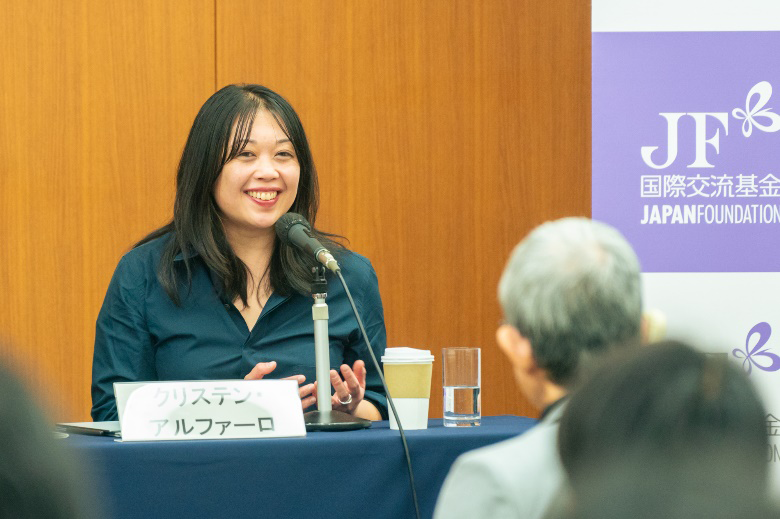
Paramaditha: From what I have seen so far, the most effective is the organic people-to-people connection because people are more creative in these small places. What I did with my feminist collectives in Indonesia was to create forums on transnational feminist solidarity. We have different themes each year. We did talk about settler colonialism in West Papua, in Australia, in Palestine. How do we connect settler colonialism in these different countries? They seem to be very different, but we want to build a dialogue. Even this forum is a way to build or start a dialogue about transnational feminist connection and solidarity.
The last comment around this issue of building solidarity is that we need to start reading each other. In Indonesia, we read a lot of Japanese writers. For instance, at the Makassar International Writers Festival, they invited Murata Sayaka. So many Japanese writers have been translated, but I don't think the same thing happens in Indonesian literature. When you talk about cultural exchange, it's not always equal. The same thing goes for, let’s say, Indonesians as they don’t read so much Vietnamese literature. They do read a lot of Korean and Japanese literature, but they don’t know anything about the Philippines. That’s the problem. I think we should start reading each other.
Alfaro: That’s another big goal. I don't know if we will ever get money to support this goal, but translating across Southeast Asia is what we have wanted to support. In that discussion in Bangkok, someone just said that we have to all agree that English is going to be the language in which we read each other, but I don't want that to be the case. How do we support that kind of initiative as a UK-based publisher who's always going to be translating from another language into English? These are the kinds of questions that I grapple with all the time, and I don't know what the answer is.
Another thing that I wanted to draw back to what Intan was saying is intimacy. The only way to get to where you want to get to in terms of being collective and having these conversations is to create intimate spaces to have them. This forum might be one or a dinner table. We have to think alongside and use different words to describe this, like intimacy, care, or compassion.
Ogawa: I think the word "intimacy" kind of brings all of us back to the words "compassion and care" where we started today. We traveled imaginatively to various spaces, including Indonesia, London, Vietnam, Korea, and the Philippines. I think the question we kept asking ourselves was, "How do we form solidarity among ourselves?" I think it's a challenging situation, especially when we are seeing the war in Gaza. We have to create as much as we can these kinds of intimate spaces where we can show our compassion and use our techniques, narratives, and stories of care to form that kind of solidarity.
Alfaro: I just want to say how important the role of the translator is. I want to take this space to acknowledge how important translators have been to us in terms of the literature that we publish, particularly for Japanese literature in Tilted Axis, Morgan Giles, and Polly Barton. Translators play an important role in allowing foreign publishers to access literature. It's a wonderful profession. I hope more people here in the audience will become literary translators and pitch to me.
Ogawa: I am sure there are a few translators I can see in this audience. I am very fortunate to have this occasion to be able to converse with such important issues with these two amazing women. I would very much like to invite you to give them a big round of applause. Thank you very much.
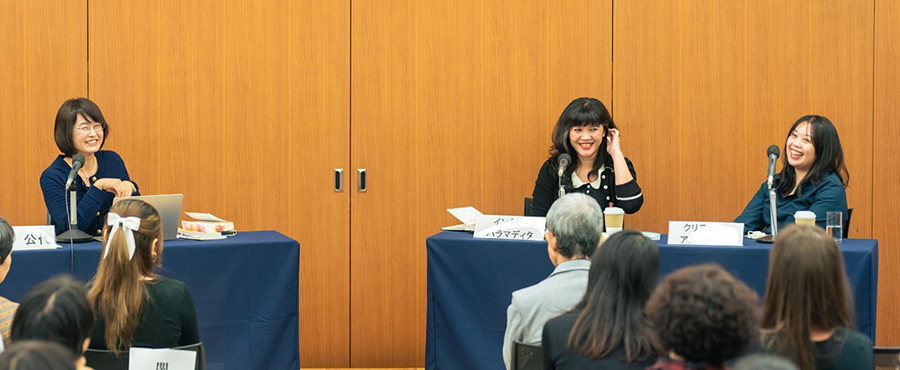
Photo by Sato Motoi
- What We Do Top
- Arts and Cultural Exchange [Culture]
- Japanese-Language Education Overseas [Language]
- Japanese-Language Education Overseas [Language] Top
- Learn Japanese-language
- Teach Japanese-language
- Take Japanese-Language Test
- Know about Japanese-language education abroad
- The Japanese-Language Institute, Urawa
- The Japanese-Language Institute, Kansai
- Japanese-Language Programs for Foreign Specified Skilled Worker Candidates
- Japanese Language Education for Japanese Children Resident Overseas and for the Descendants of Migrants
- Archives
- Japanese Studies and Global Partnerships [Dialogue]
- JF digital collection
- Other Programs / Programs to Commemorate Exchange Year
- Awards and Prizes
- Publications

